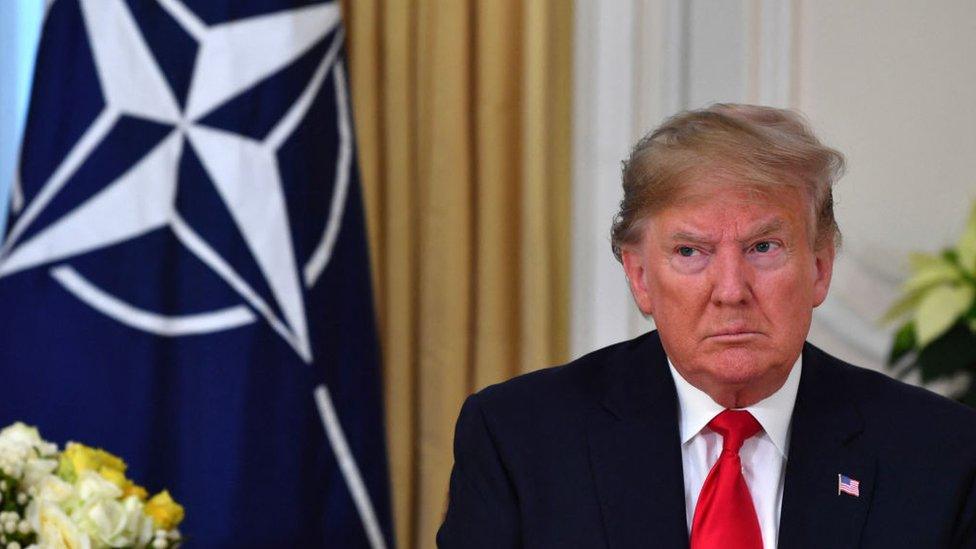Trump says he would 'encourage' Russia to attack Nato allies who do not pay their bills
- Published
Watch: Trump would not protect countries from attack by Russia if they do not pay enough into Nato
Donald Trump has said he would "encourage" Russia to attack any Nato member that fails to pay its bills as part of the Western military alliance.
At a rally on Saturday, he said he had once told a leader he would not protect a nation behind on its payments, and would "encourage" the aggressors to "do whatever the hell they want".
Members of Nato commit to defend any nation in the bloc that gets attacked.
The White House called the comments "appalling and unhinged".
Nato chief Jens Stoltenberg said any suggestion that "allies will not defend each other undermines all of our security", putting soldiers from Nato countries at risk.
Addressing crowds during the rally in South Carolina, Mr Trump said he had made his comments about Russia during a meeting of leaders of Nato countries.
He recalled that the leader of a "big country" had presented a hypothetical situation in which he was not meeting his financial obligations within Nato and had come under attack from Moscow.
Mr Trump said the leader had asked if the US would come to his country's aid in that scenario, which prompted him to issue a rebuke.
"I said: 'You didn't pay? You're delinquent?'... 'No I would not protect you, in fact I would encourage them to do whatever they want. You gotta pay.'"
A White House spokesman said the former president was "encouraging invasions of our closest allies by murderous regimes" and labelled the comments "appalling and unhinged".
He added that the statement "endangers American national security, global stability and our economy at home".
In a statement responding to Mr Trump's comment on Sunday, Nato Secretary General Jens Stoltenberg said: "Any suggestion that allies will not defend each other undermines all of our security, including that of the US, and puts American and European soldiers at increased risk.
"I expect that regardless of who wins the presidential election, the US will remain a strong and committed Nato ally."
Mr Trump, the favourite to run again as the Republican candidate in this year's US presidential election, has long been critical of Nato and what he sees as an excessive financial burden on the United States to guarantee the defence of 30 other nations.
Dr Patrick Bury, a defence and security expert and former Nato analyst, told the BBC that Mr Trump was reflecting anger in the US that some European Nato countries were not spending 2% of their budget on the military, as Nato wants.
"Playing hardball with Nato allies is correct, but it all depends on how far you go. These comments are too far, really," he said.
But he said such statements had an impact at a time when Russia had put its economy onto a war footing and its military spending was outstripping that of European countries.
"If Trump is in the White House and there was a split in Nato either over Ukraine... or about how it would respond to a small incursion that should in theory trigger article five. That's where the Nato alliance is worried are these what-ifs," he said.
Russia launched its full-scale invasion of Ukraine in 2022, after Mr Trump left office. He has since bemoaned the amount of US money sent to Ukraine, which is not a Nato member.
The US has provided Ukraine with more financial support than any other country - totalling more than $44bn (£34bn) since the 2022 invasion, according to White House figures from December.
However, Republicans in Congress have since the turn of the year blocked all new funding - demanding tough measures to restrict migration into the US on its southern border, and then refusing the amended bill when it was presented earlier this week.
Mr Trump celebrated that rejection during Saturday's rally, saying the proposals made by President Biden had been "disastrous".
The two issues have now been successfully separated, meaning that senators are now able to debate the aid money separately.
